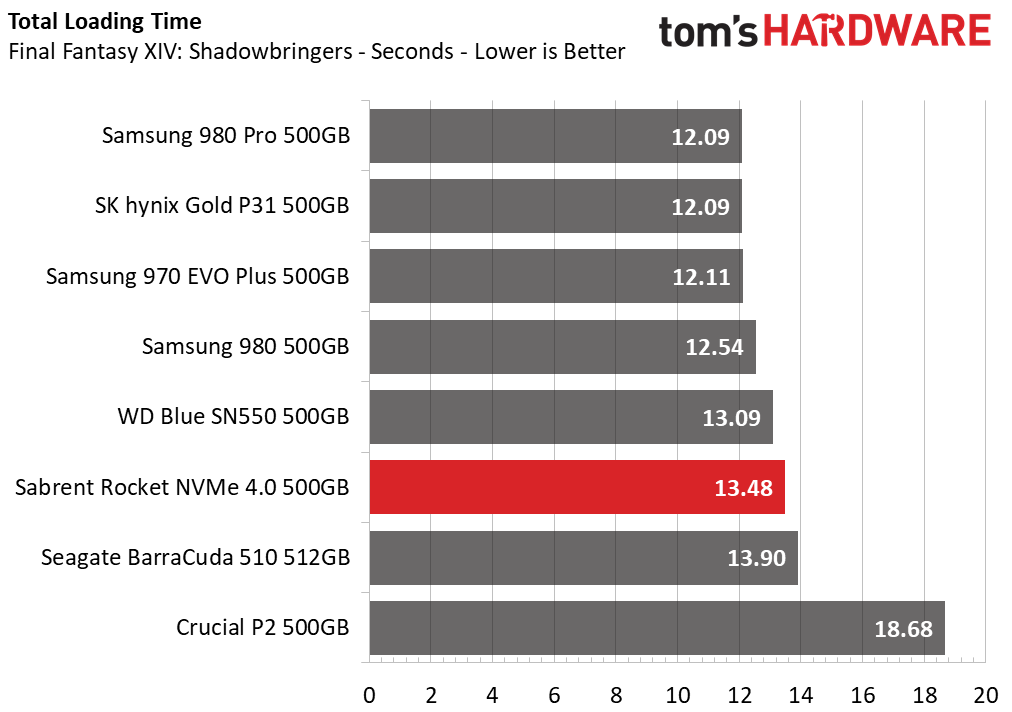Why you can trust Tom's Hardware
Comparison Products
Today we compare Sabrent’s 500GB Rocket NVMe 4.0 against many of the best SSD on the market, including the Samsung 980 Pro, 970 EVO Plus, SK hynix Gold P31, and Seagate BarraCuda 510. We also include a few value-based competitors including the Samsung 980, Crucial P2, and WD Blue SN550.
Game Scene Loading - Final Fantasy XIV
Final Fantasy XIV Shadowbringers is a free real-world game benchmark that easily and accurately compares game load times without the inaccuracy of using a stopwatch.
In terms of game level loading, Sabrent Rocket NVMe 4.0 delivered a solid performance but was not quite as responsive as Samsung’s SSDs, nor the SK hynix Gold P31.
Transfer Rates – DiskBench
We use the DiskBench storage benchmarking tool to test file transfer performance with a custom dataset. We copy a 50GB dataset, including 31,227 files of various types, like pictures, PDFs, and videos, to a new folder and then follow-up with a reading test of a newly-written 6.5GB zip file.
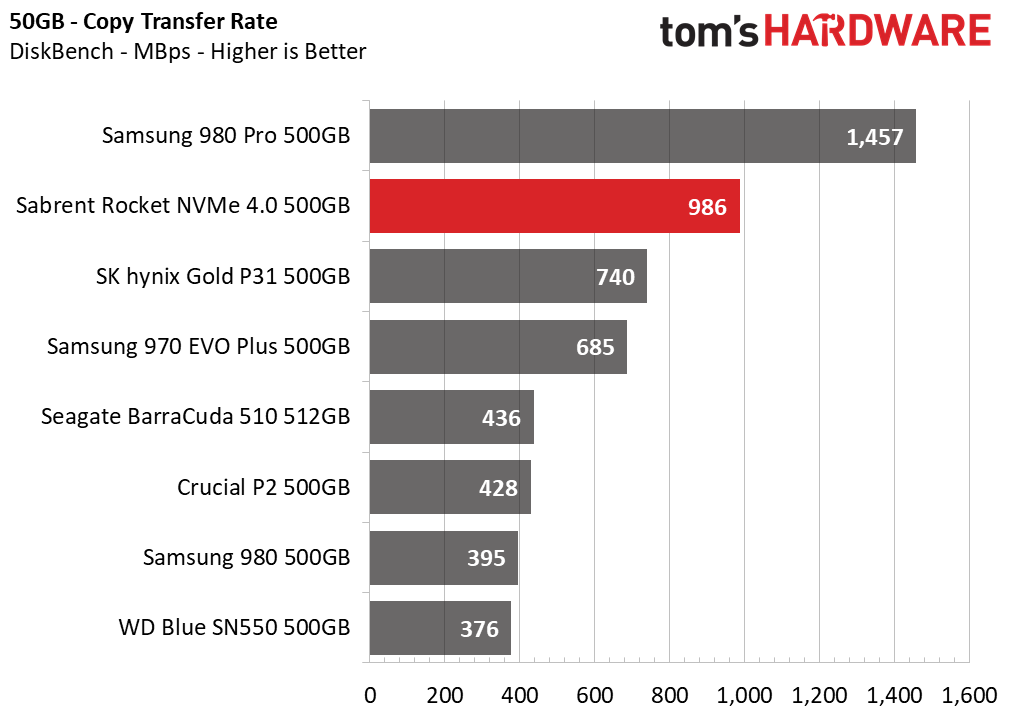
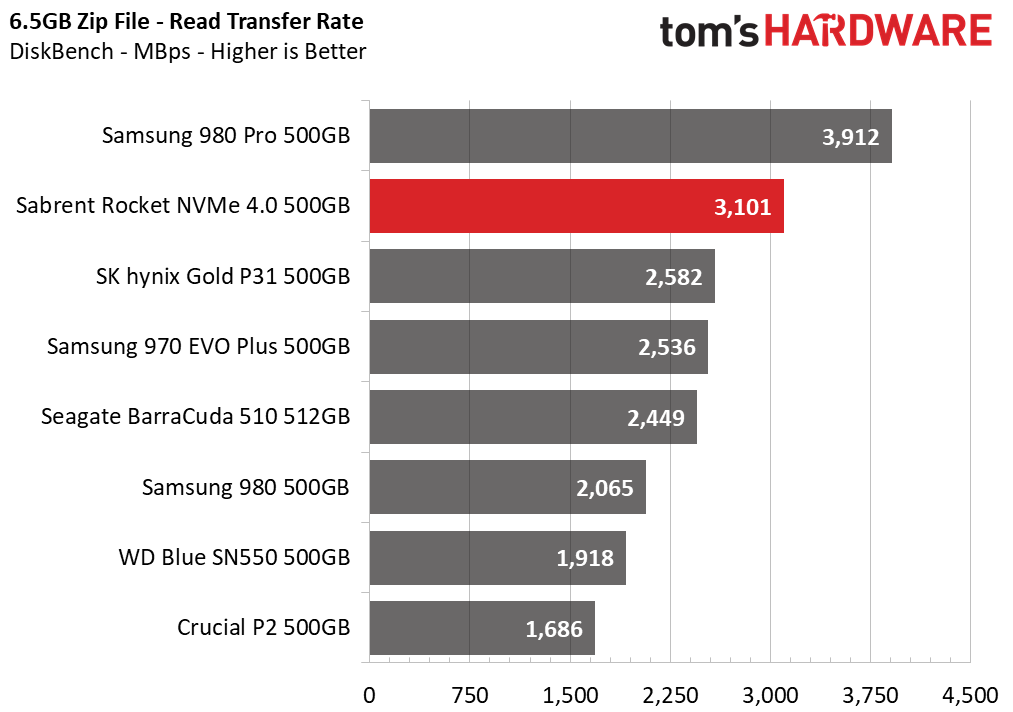
Samsung’s 980 Pro edged out ahead of the Rocket NVMe 4.0 once again, but overall, the Sabrent Rocket NVMe 4.0 delivers fast file transfer speeds in our tests. Due to lower bandwidth, not even SK hynix’s Gold P31 can touch the level of performance of the Rocket NVMe 4.0 during most large file copies.
Trace Testing – PCMark 10 Storage Test
PCMark 10 is a trace-based benchmark that uses a wide-ranging set of real-world traces from popular applications and everyday tasks to measure the performance of storage devices. The quick benchmark is more relatable to those who use their PCs for leisure or basic office work, while the full benchmark relates more to power users.
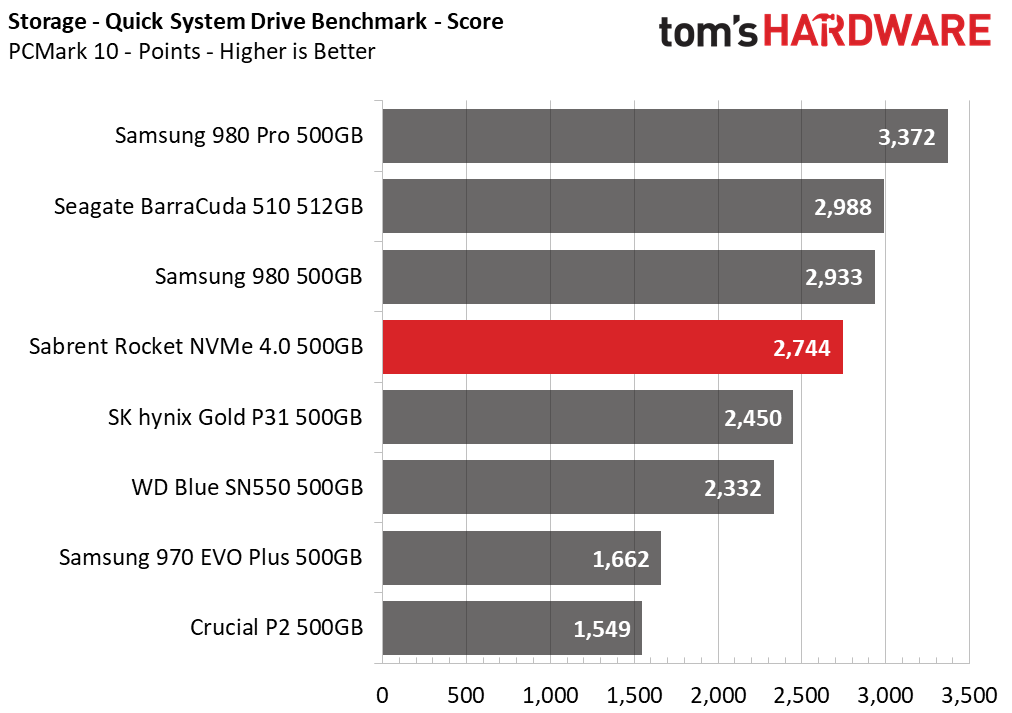
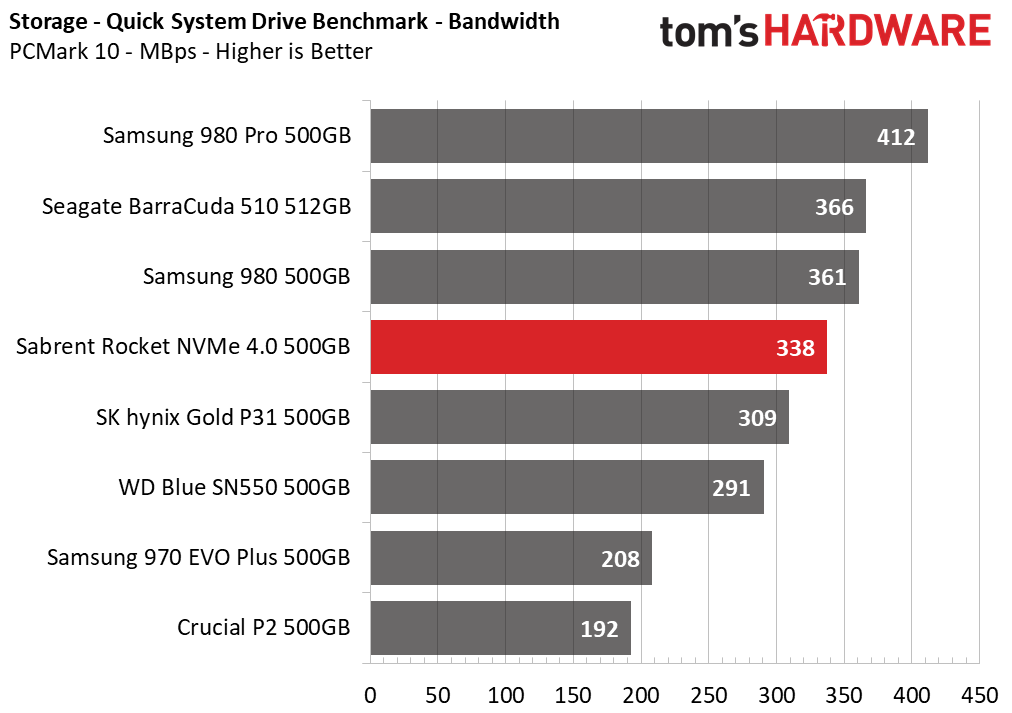
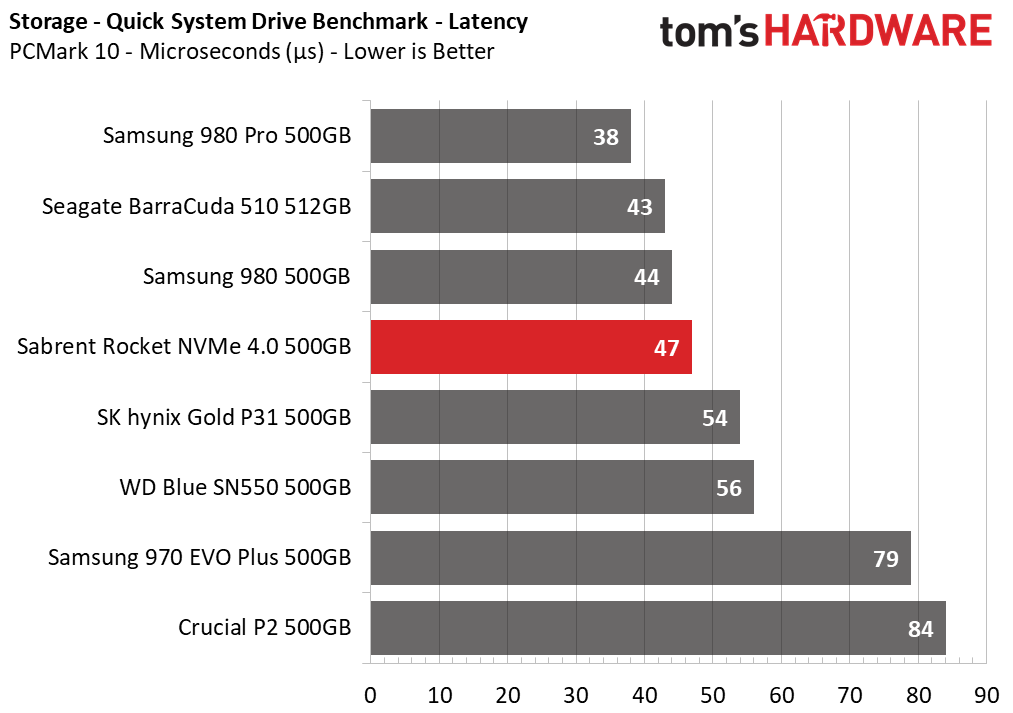
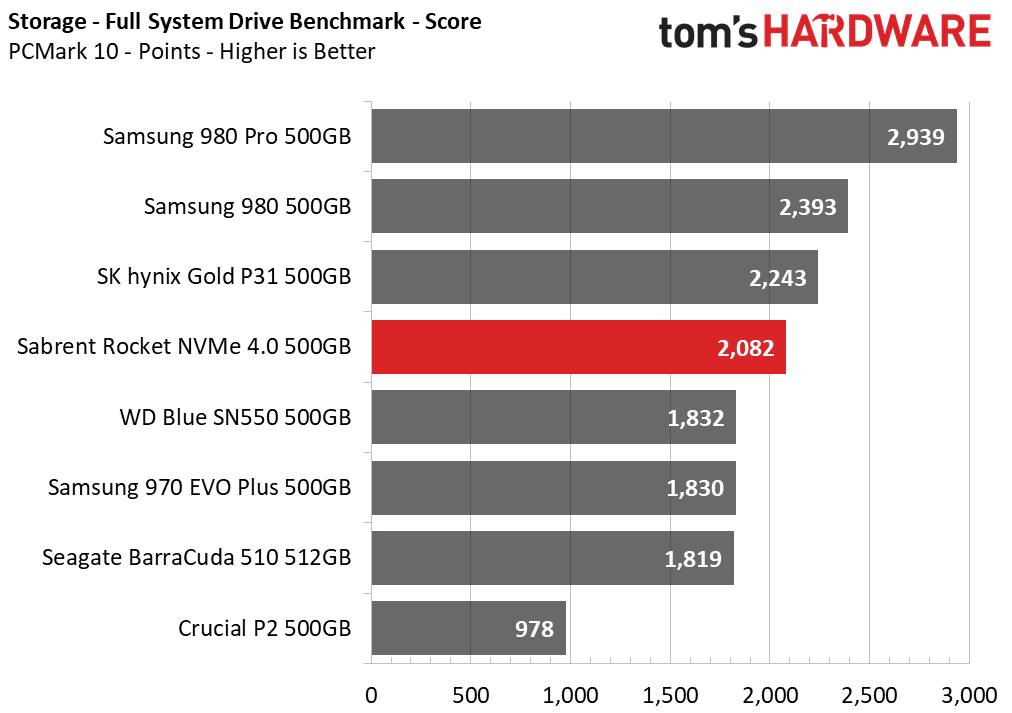
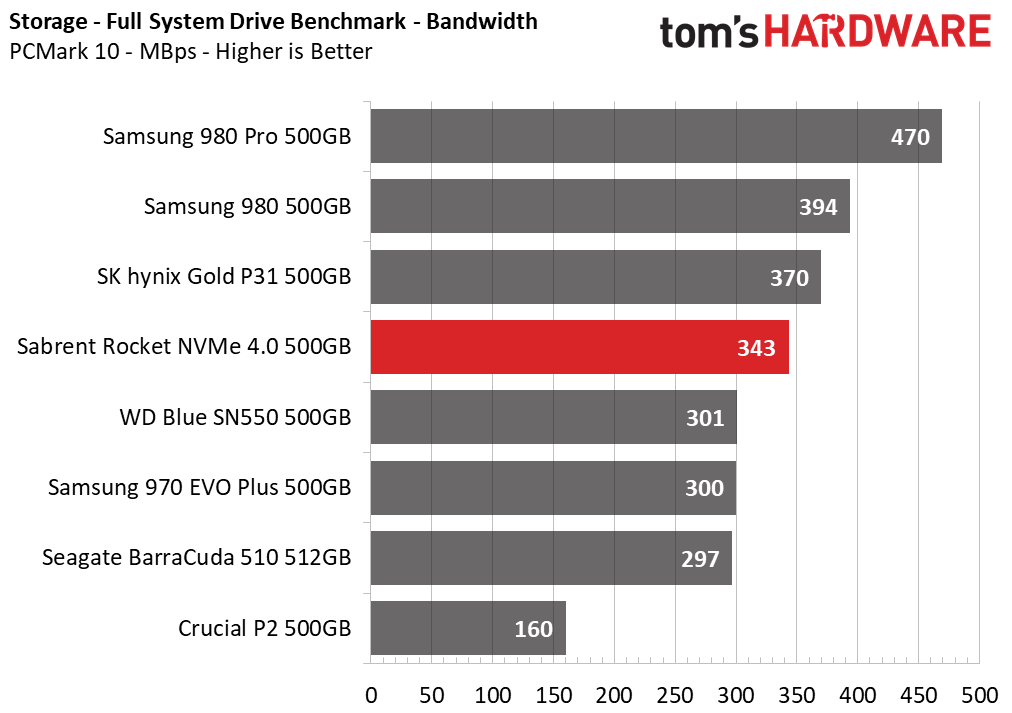
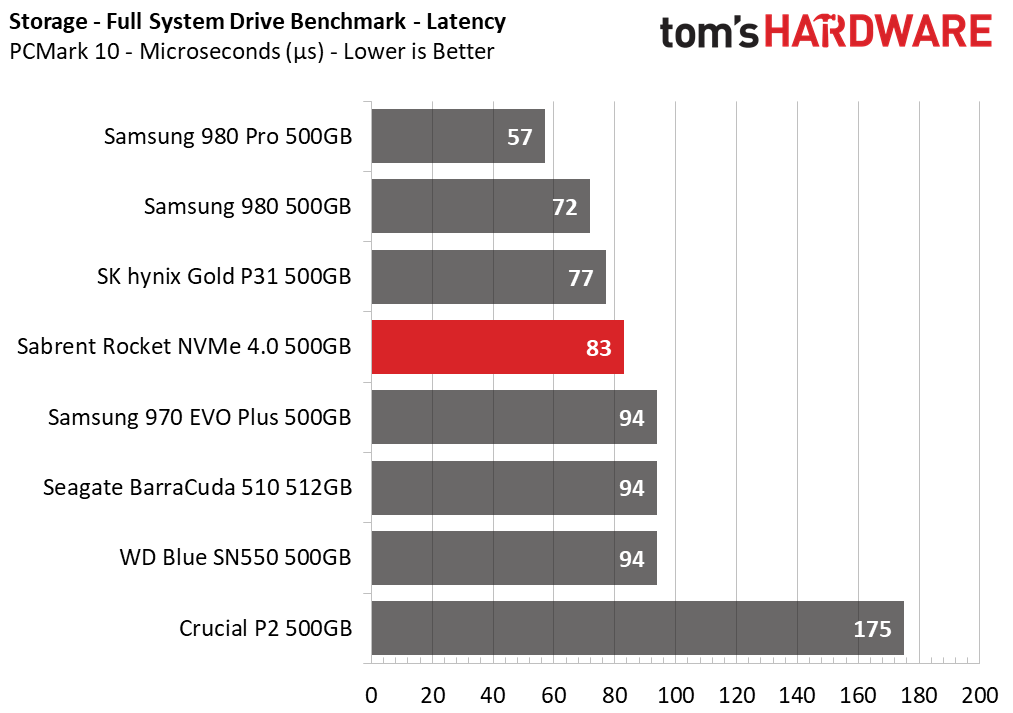
Sabrent’s Rocket NVMe 4.0 proved responsive in PCMark 10’s Quick System Benchmark and traded blows with both Samsung’s 980 and SK hynix’s Gold P31, but ultimately fell short of both during the much heavier Full System Drive Benchmark passes.
Get Tom's Hardware's best news and in-depth reviews, straight to your inbox.
Synthetic Testing - ATTO / CrystalDiskMark
ATTO and CrystalDiskMark (CDM) are free and easy-to-use storage benchmarking tools that SSD vendors commonly use to assign performance specifications to their products. Both of these tools give us insight into how each device handles different file sizes.
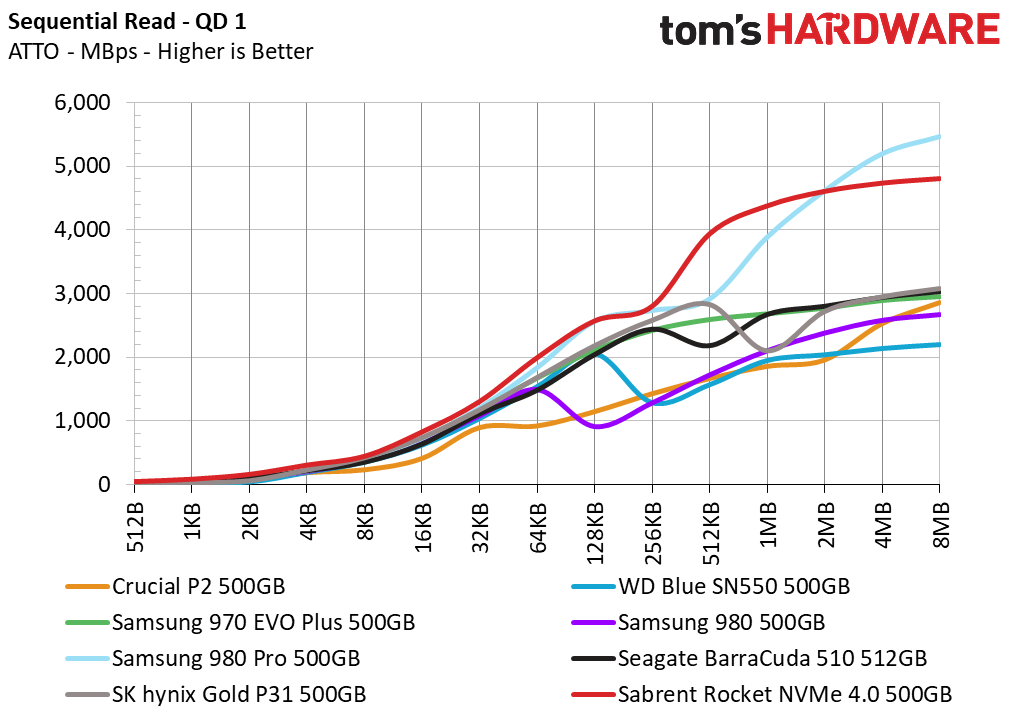
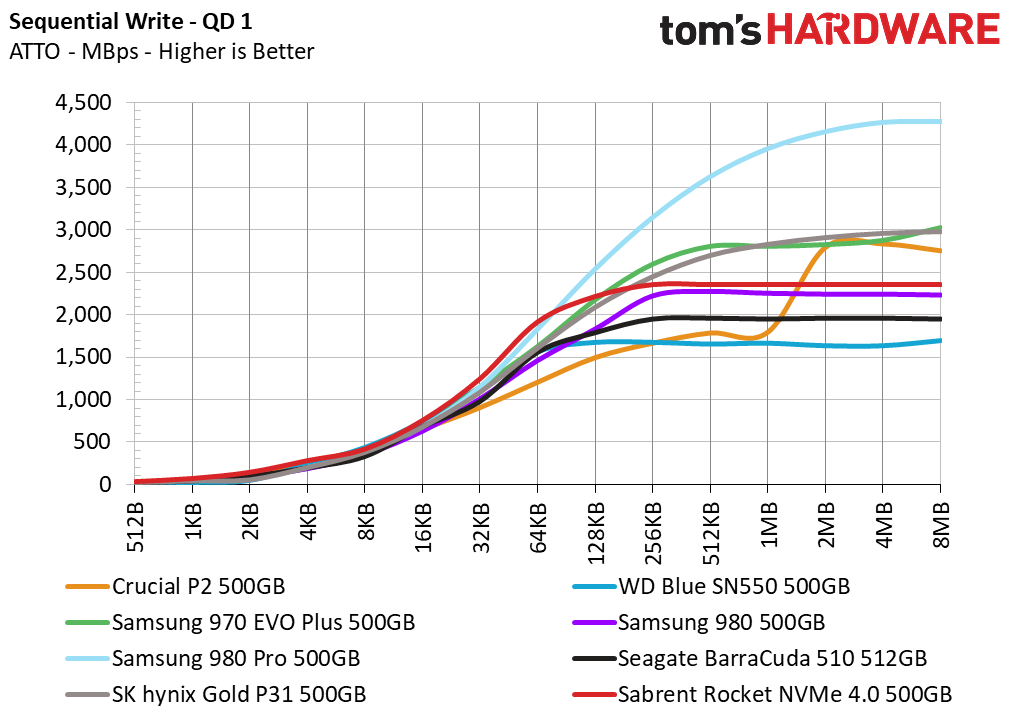
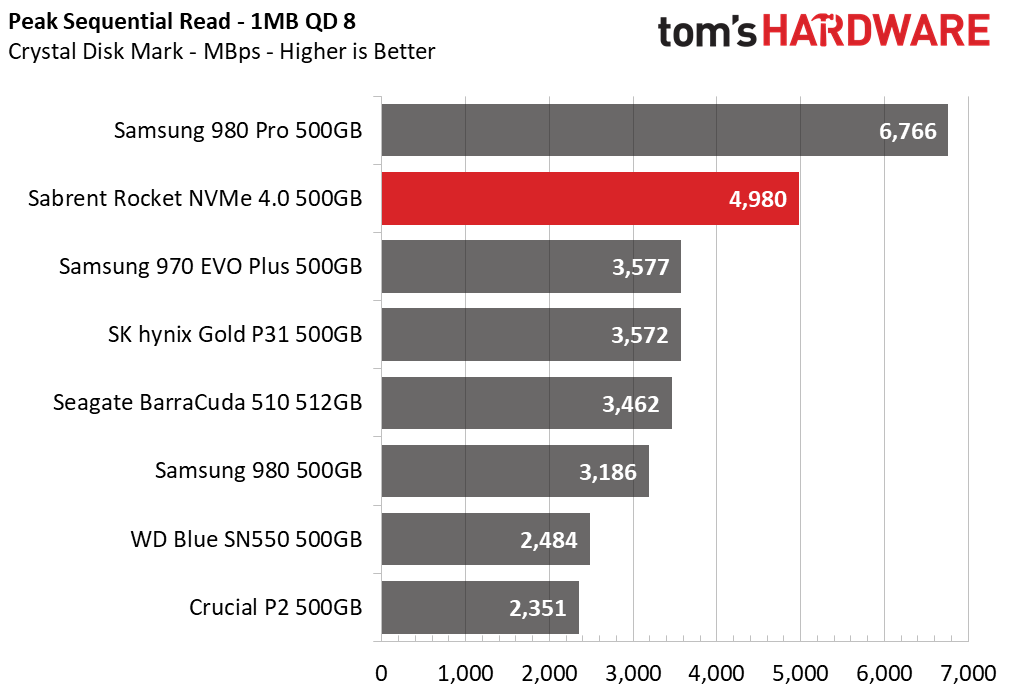
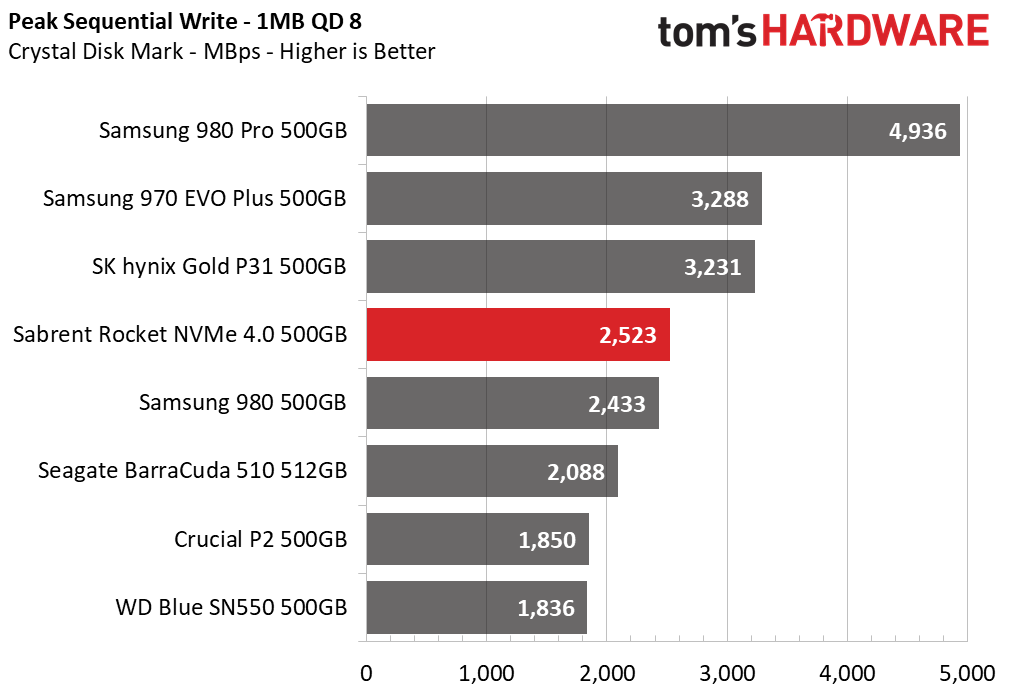
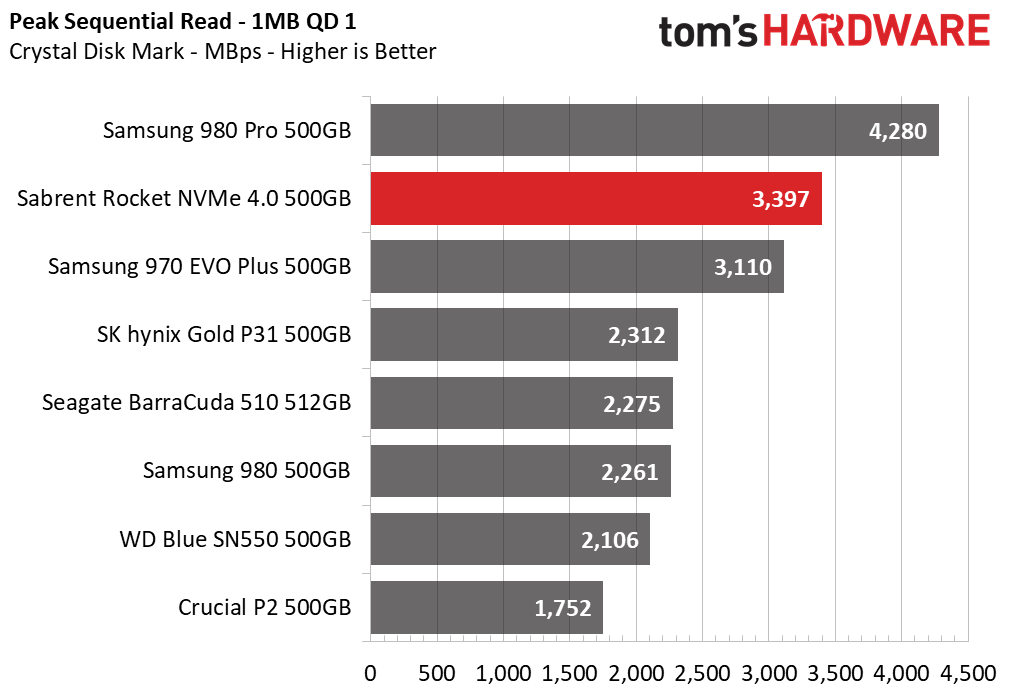
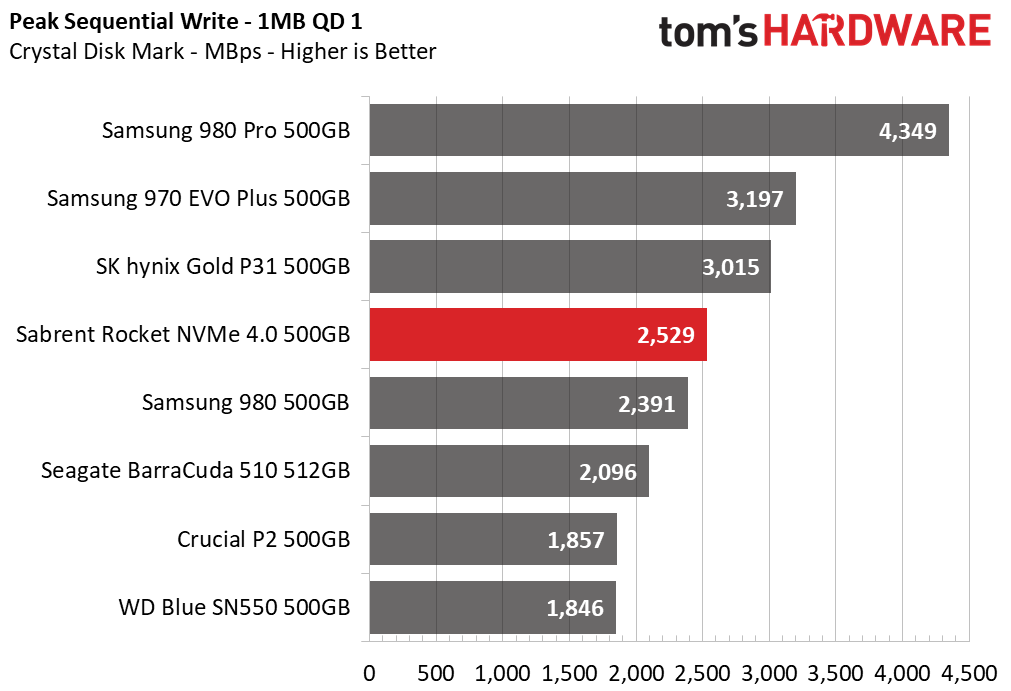
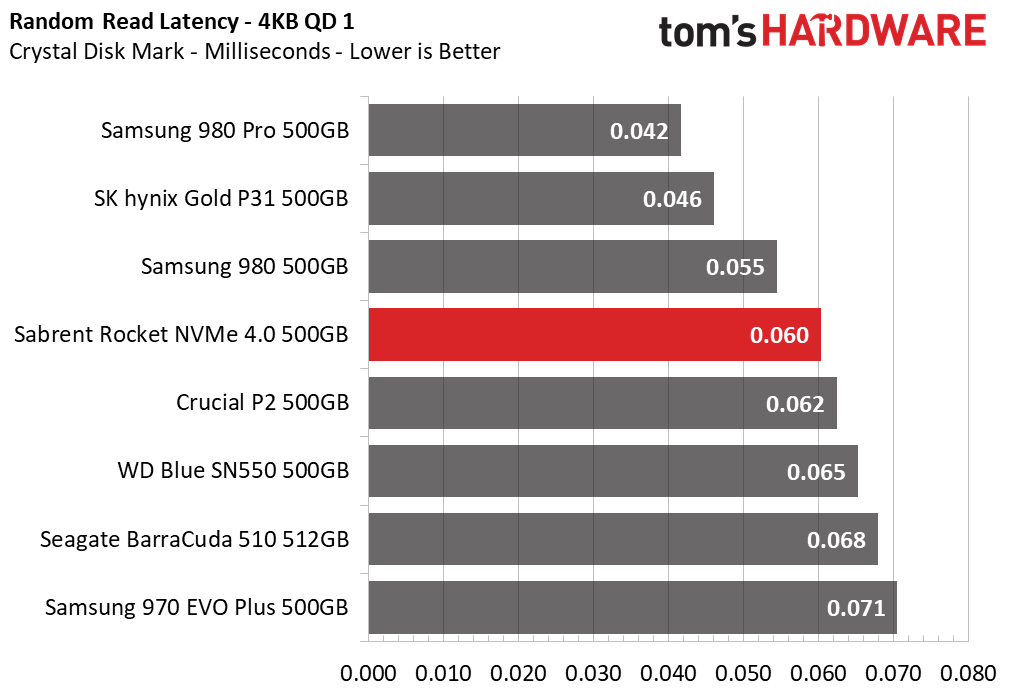
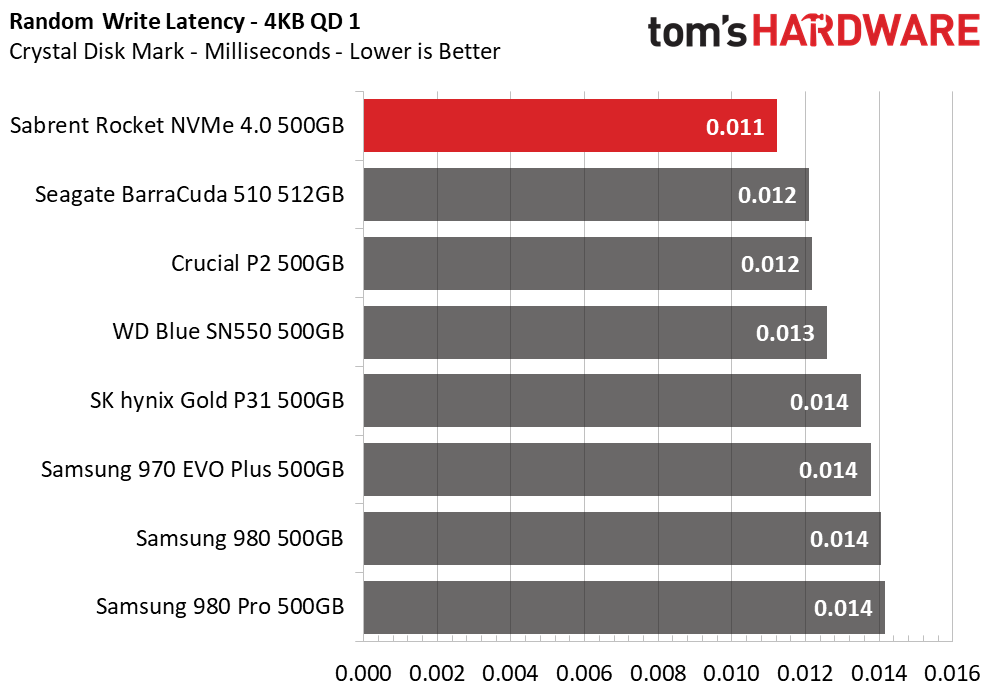
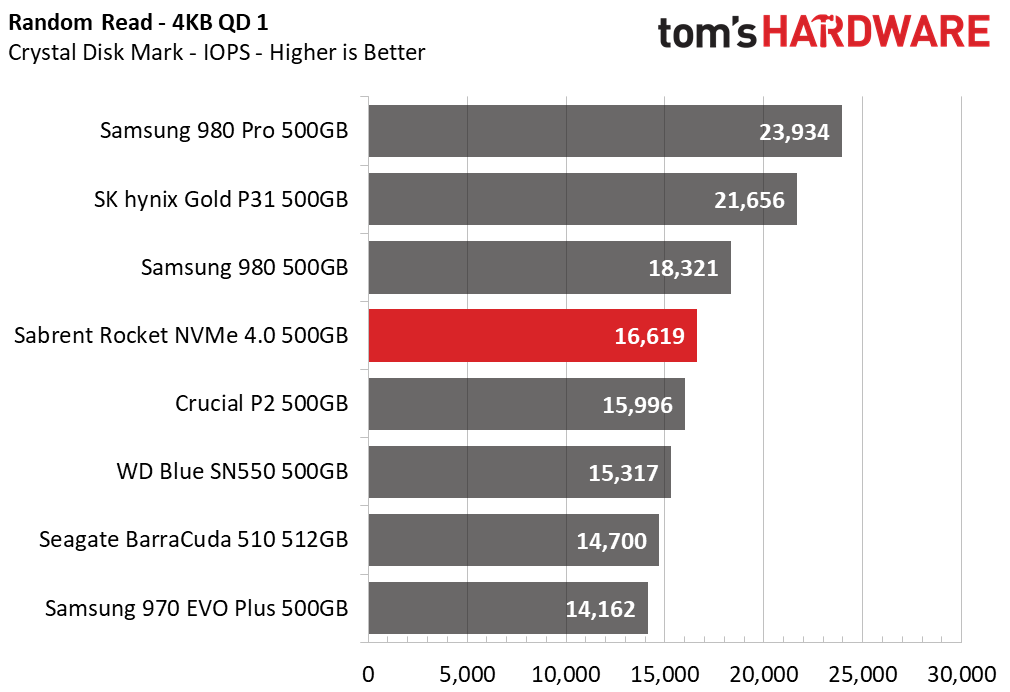
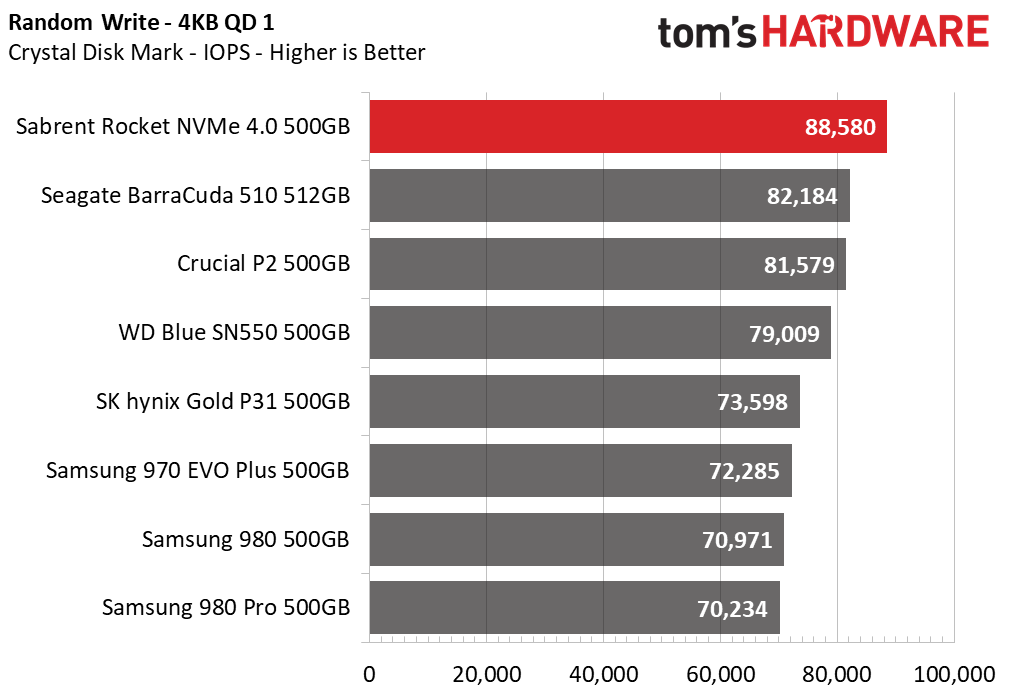
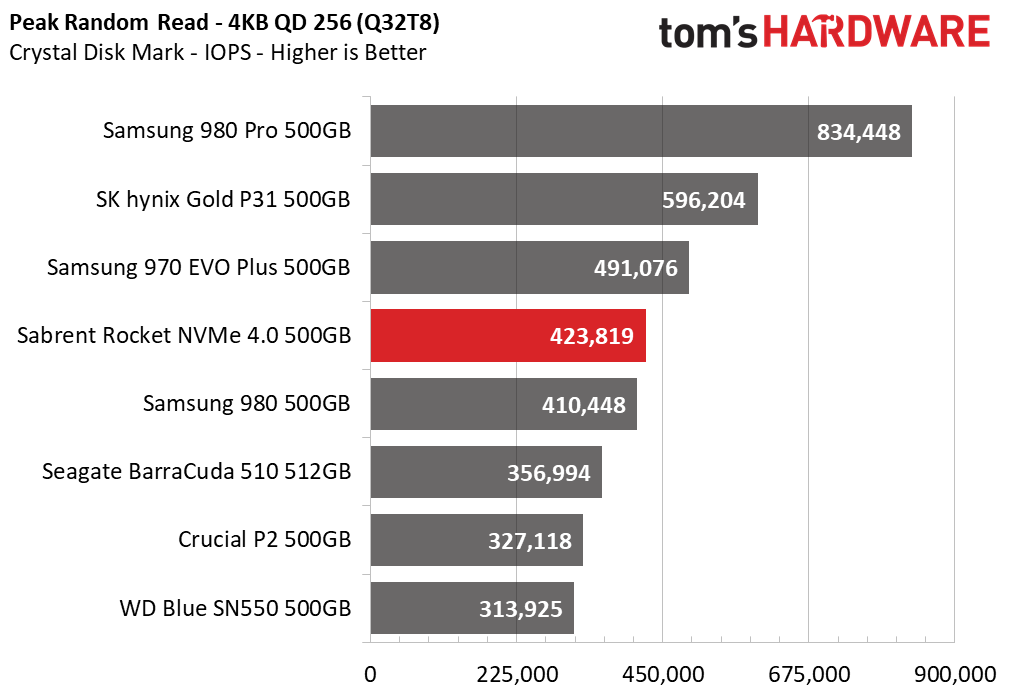
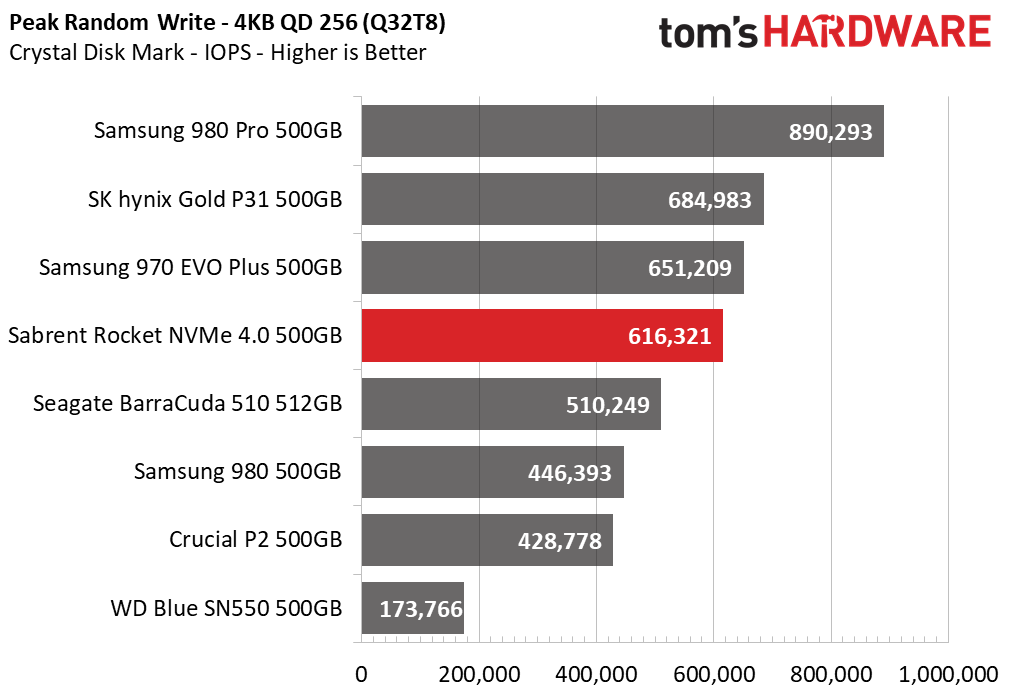
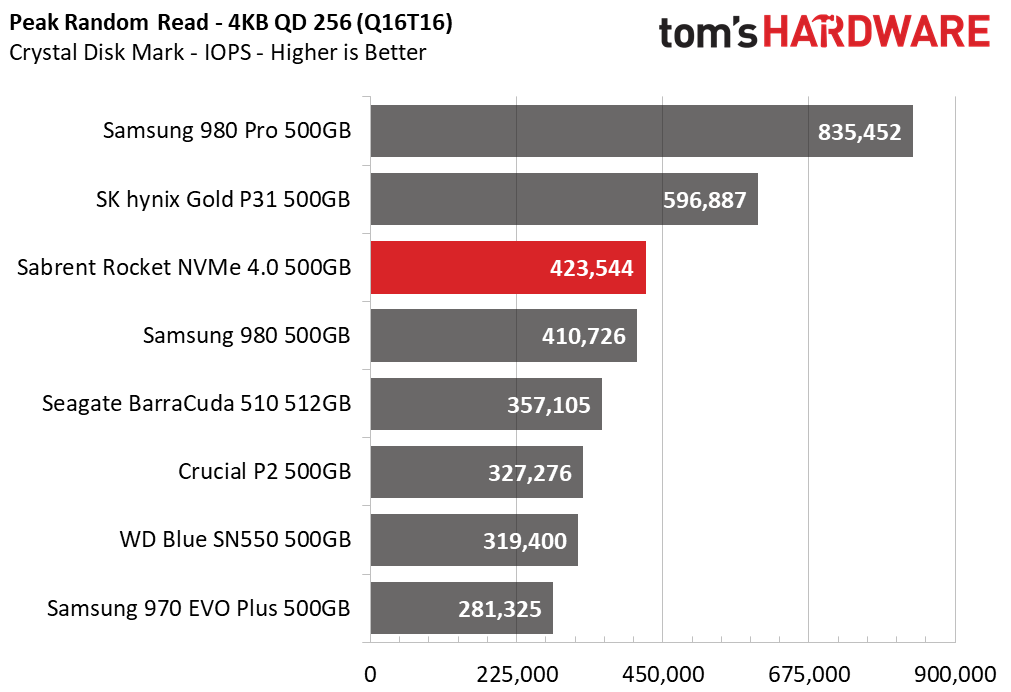
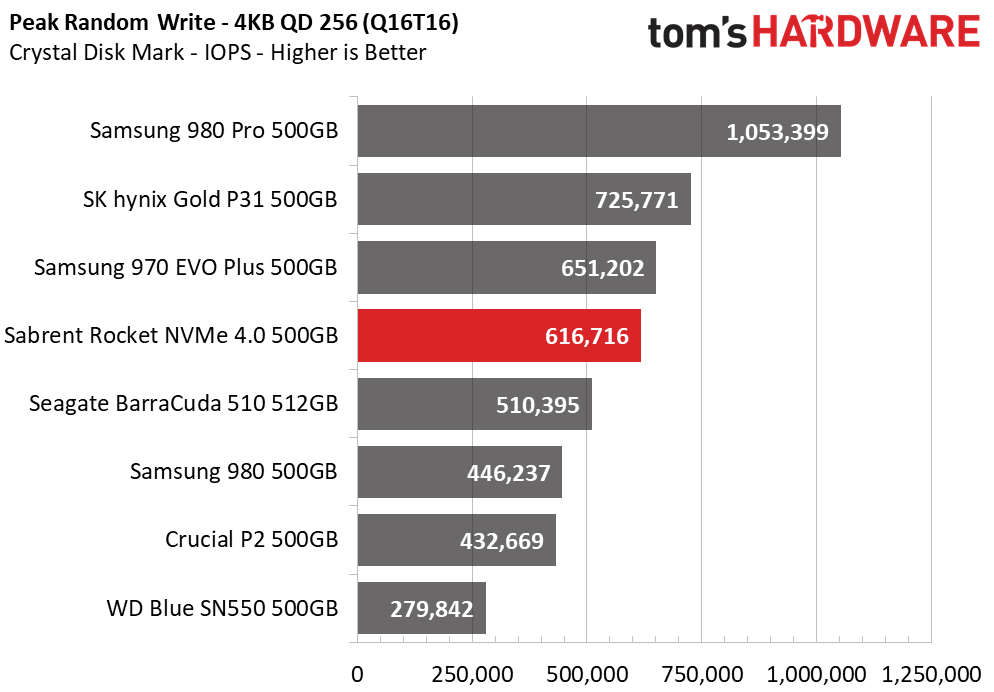
When tested at a QD of one (QD1), the Rocket NVMe 4.0 delivered similar read and write performance as the Samsung 980 Pro with small files, but trailed it when hit with larger files. The Rocket NVMe 4.0’s random performance was solid too, but not quite as responsive as Samsung’s 980 Pro nor the SK hynix Gold P31.
Sustained Write Performance and Cache Recovery
Official write specifications are only part of the performance picture. Most SSDs implement a write cache, a fast area of (usually) pseudo-SLC programmed flash that absorbs incoming data. Sustained write speeds can suffer tremendously once the workload spills outside of the cache and into the "native" TLC or QLC flash. We use iometer to hammer the SSD with sequential writes for 15 minutes to measure both the size of the write cache and performance after the cache is saturated. We also monitor cache recovery via multiple idle rounds.
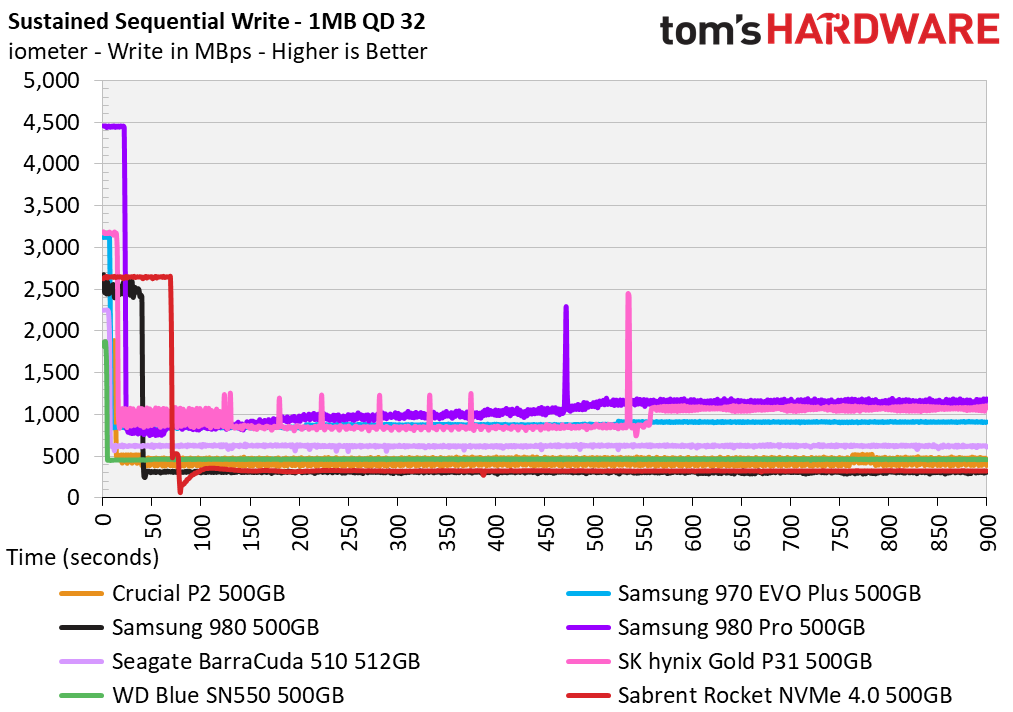
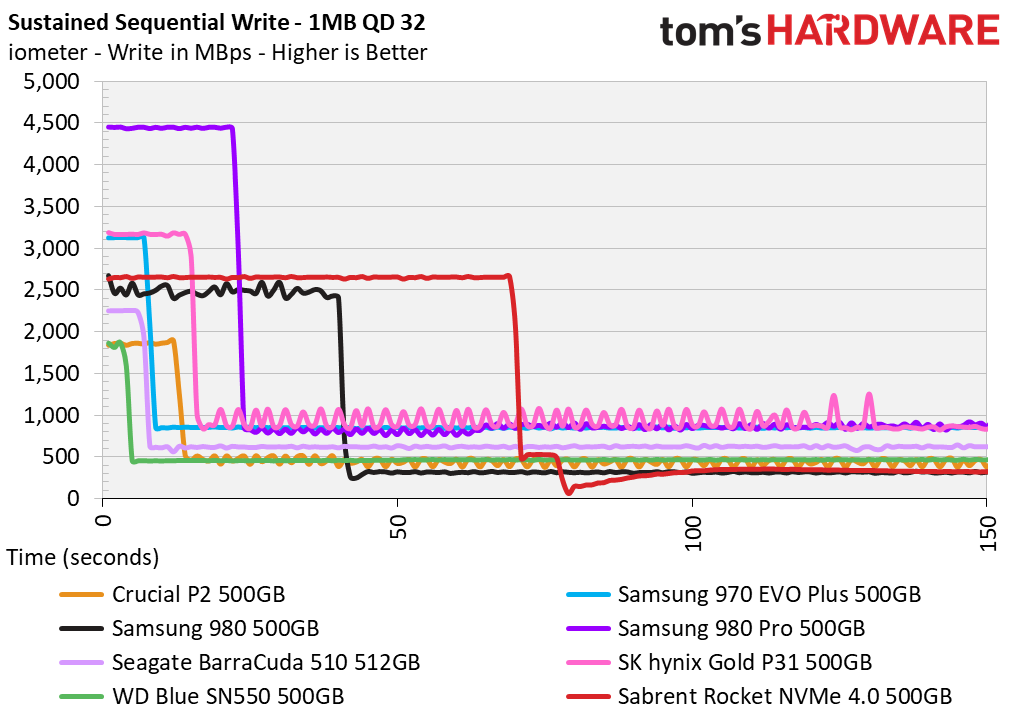
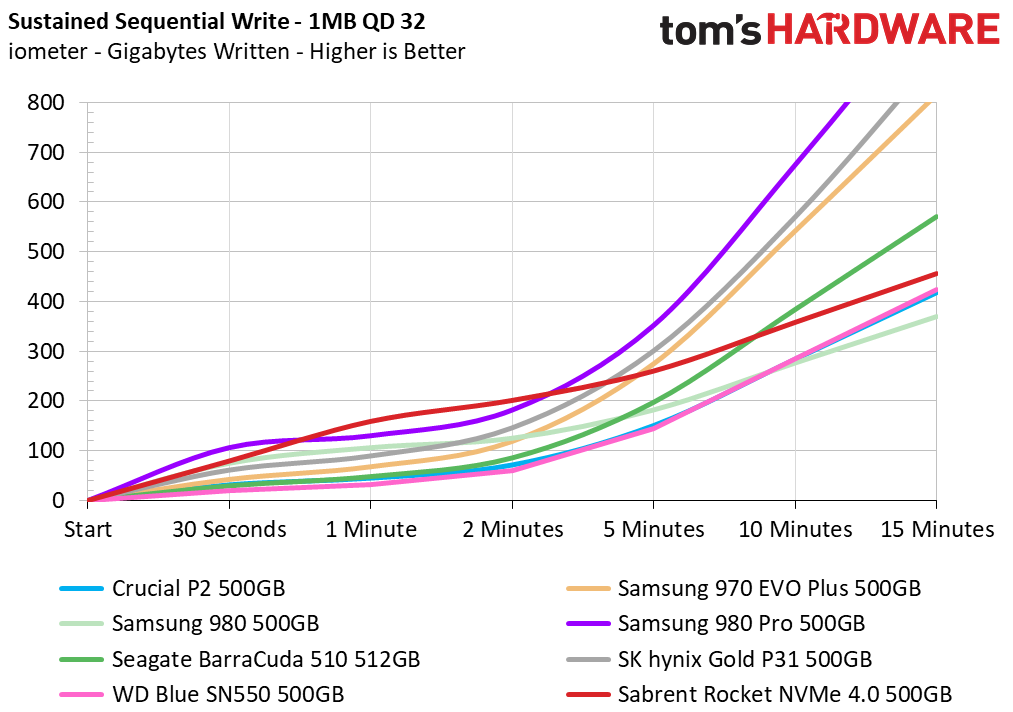
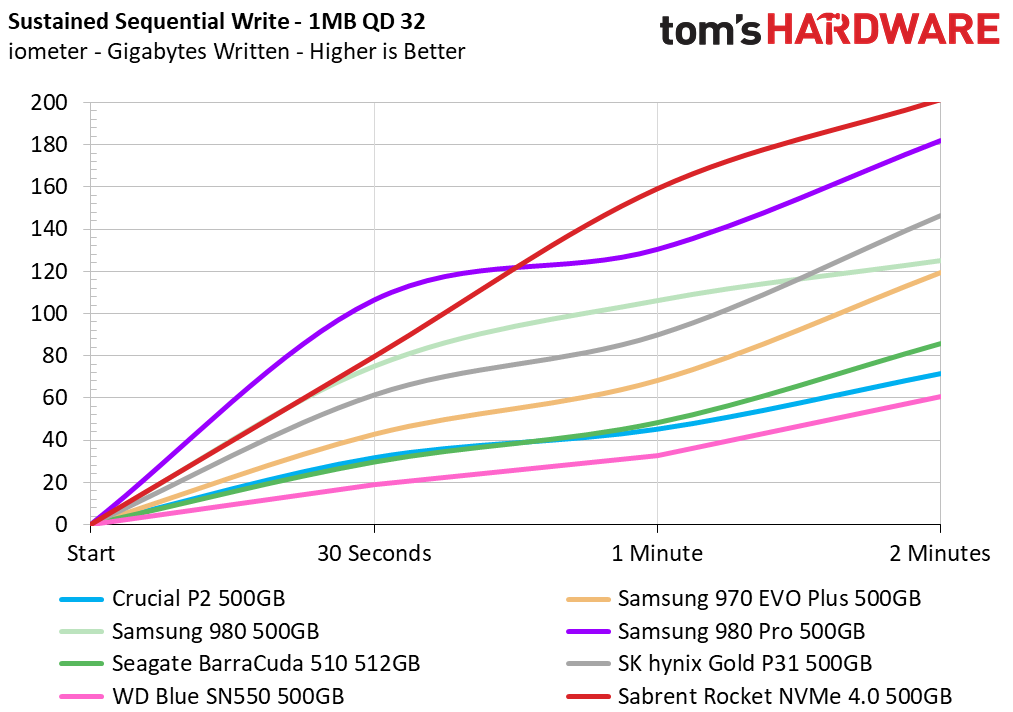
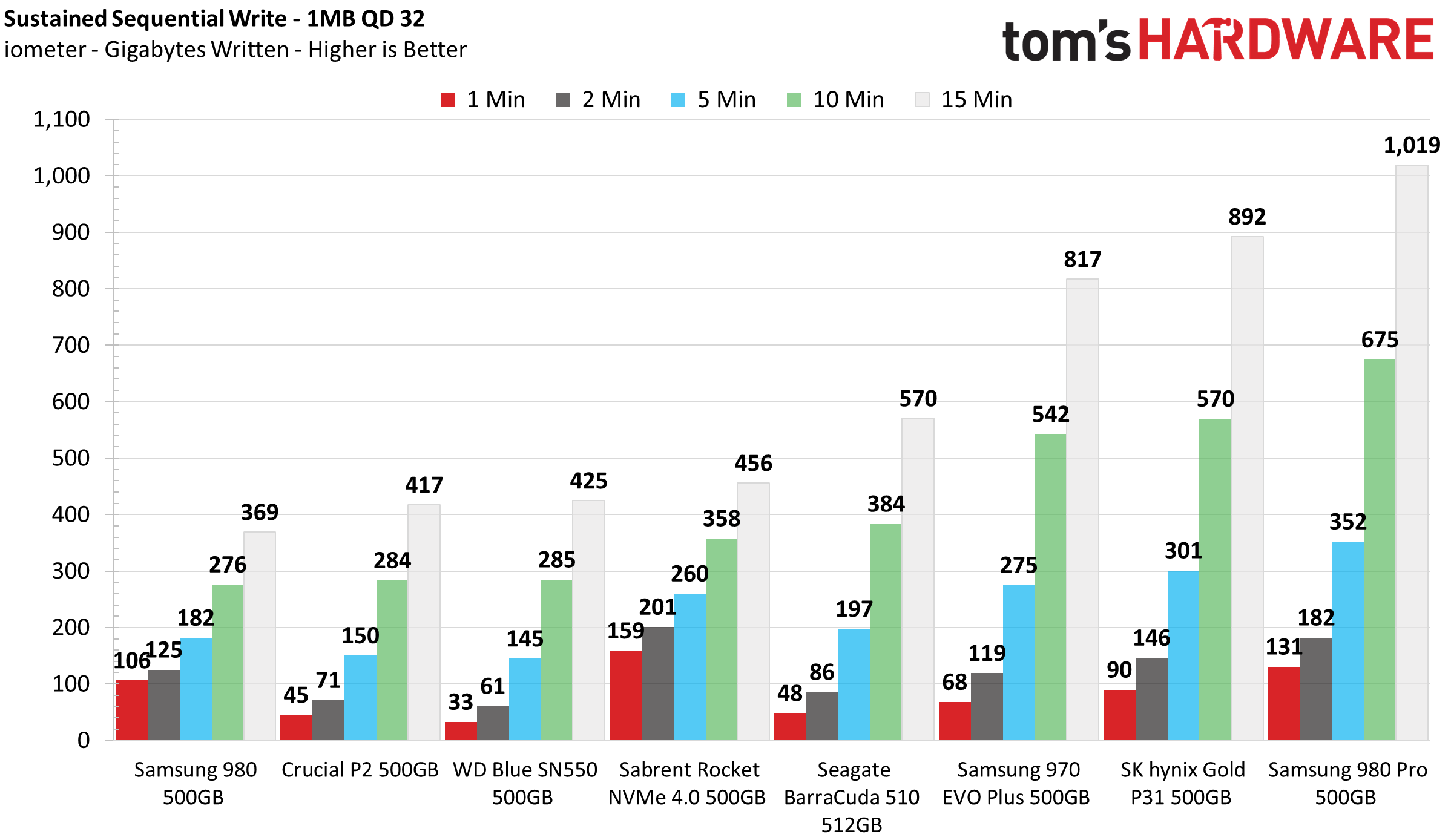
Sabren’ts Rocket NVMe 4.0 features a large dynamic write cache that spans roughly 185GB when empty. The Rocket NVMe 4.0 wrote at an average speed of 2,650 MBps before write performance degraded to an average speed of 325MBps for the remainder of the test. Once given a minute to idle, the SLC cache recovered roughly 32GB of free space.
Power Consumption and Temperature
We use the Quarch HD Programmable Power Module to gain a deeper understanding of power characteristics. Idle power consumption is an important aspect to consider, especially if you're looking for a laptop upgrade. Some SSDs can consume watts of power at idle, while better-suited ones sip just milliwatts. Average workload power consumption and max consumption are two other aspects of power consumption, but performance-per-watt is more important. A drive might consume more power during any given workload, but accomplishing a task faster allows the drive to drop into an idle state more quickly, ultimately saving energy.
We also monitor the drive’s temperature via the S.M.A.R.T. data and an IR thermometer to see when (or if) thermal throttling kicks in and how it impacts performance. Bear in mind that results will vary based on the workload and ambient air temperature.
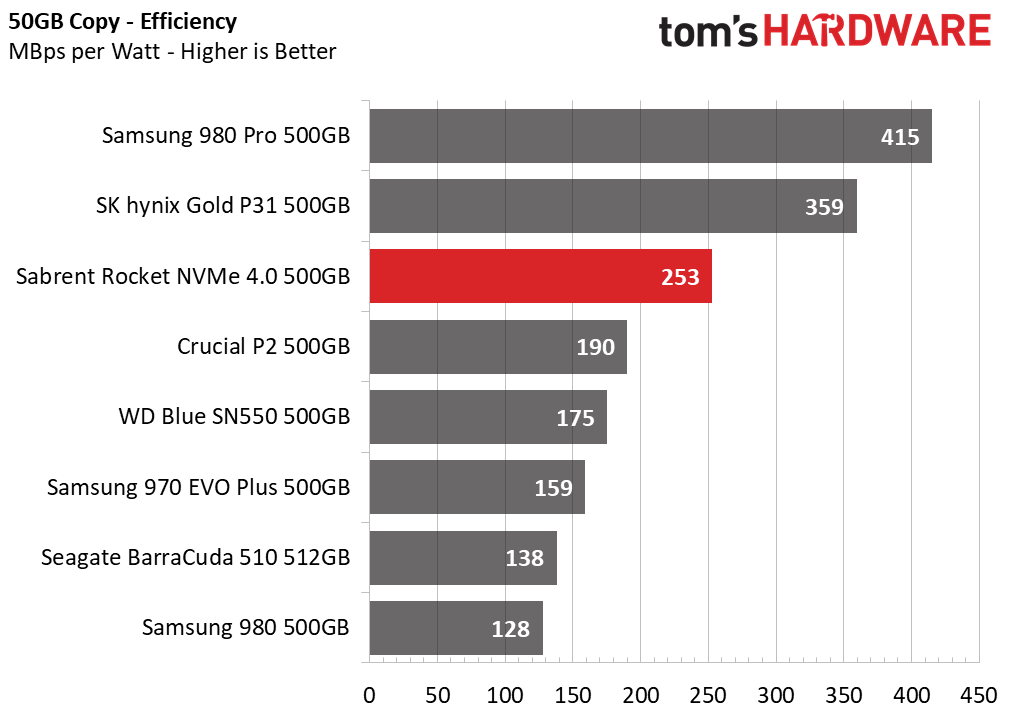
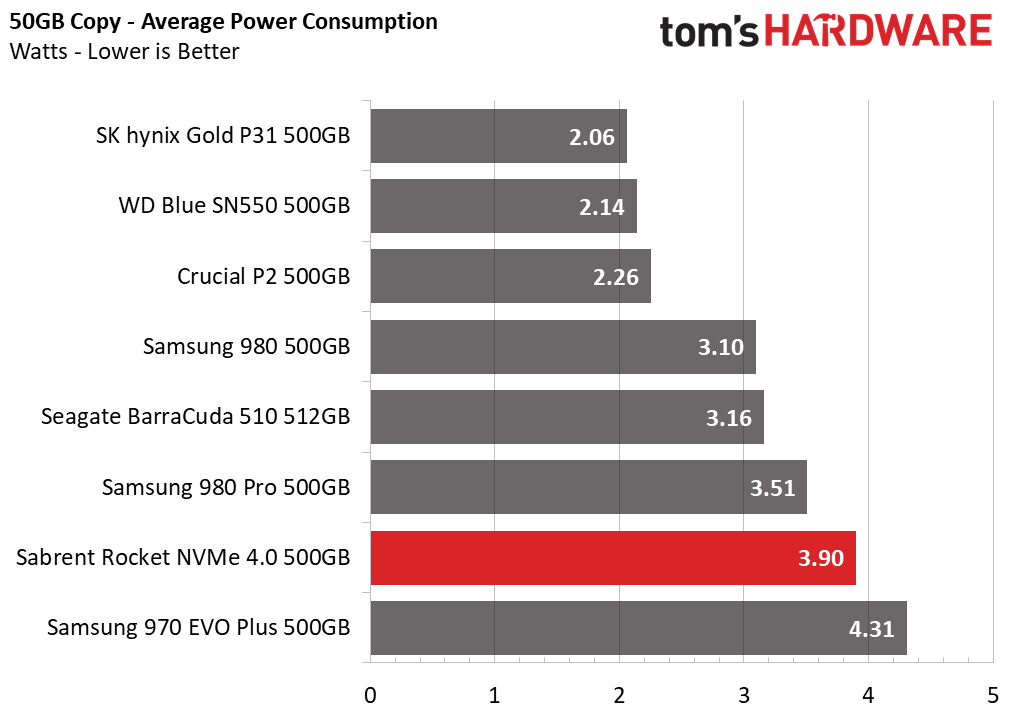
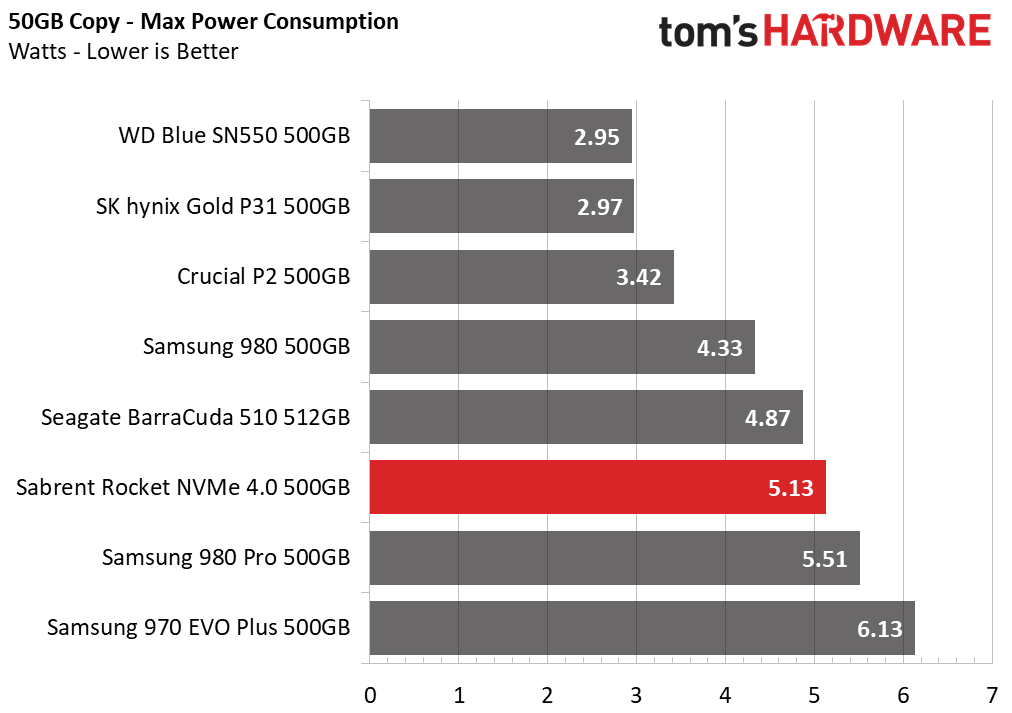
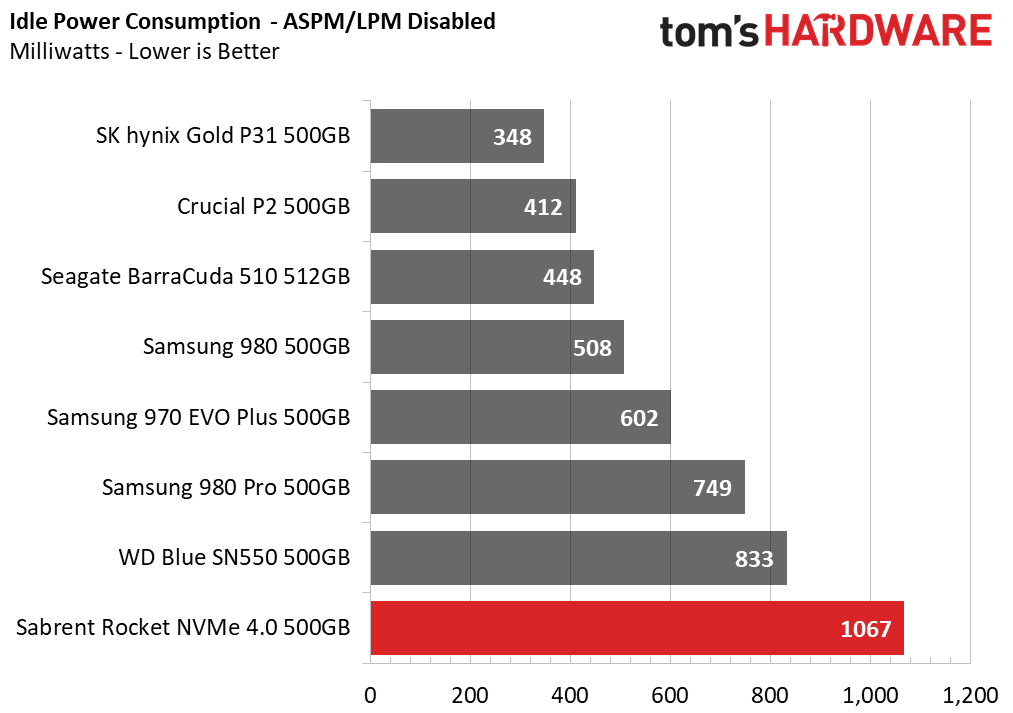
Under our copy workload, Sabrent’s Rocket NVMe 4.0 delivered a solid power efficiency result, but it wasn’t quite up to par with the best. Both the Samsung 980 Pro and SK hynix Gold P31 offer much higher efficiency than the Rocket NVMe 4.0 under load and at idle.
As for the Rocket NVMe 4.0’s heat output, the drive is unlikely to throttle in most use cases, but it still can. At idle, we measured controller temperatures at roughly 52 degrees Celsius (S.M.A.R.T. data reporting 43 degrees Celsius) in a 24-degree Celsius environment.
Without airflow, we tested to see if the SSD would throttle. Filling the SSD from empty, we wrote a 200GB folder to the SSD. At the 150GB mark, the controller temperature hit a peak of 72 degrees Celsius (60 degrees Celsius as reported by its S.M.A.R.T. data) and began to throttle.
MORE: Best SSDs
MORE: How We Test HDDs And SSDs
MORE: All SSD Content
Current page: 500GB Performance Results
Prev Page Features and Specifications Next Page 2TB Performance Results
Sean is a Contributing Editor at Tom’s Hardware US, covering storage hardware.
-
croc PCI-E speeds are supposed to double every generation. The top of the line Gen 3 SSDs are hitting around 3500 seq. read and 2500 seq. writes. The Phison controller used in almost every "Gen 4" SSD benchmarked to date limits their performance to no better than "Gen 3.5" And, even in that grouping, the Sabrent is not at the top. Shame on Tom's for making this an Editor's Choice. People that trust Tom's will learn the hard way.Reply -
seanwebster Reply
Which Gen4 drive beats it in value? Have you looked at the benchmarks page? The test results speak for themselves...croc said:PCI-E speeds are supposed to double every generation. The top of the line Gen 3 SSDs are hitting around 3500 seq. read and 2500 seq. writes. The Phison controller used in almost every "Gen 4" SSD benchmarked to date limits their performance to no better than "Gen 3.5" And, even in that grouping, the Sabrent is not at the top. Shame on Tom's for making this an Editor's Choice. People that trust Tom's will learn the hard way. -
Makaveli Replyseanwebster said:Which Gen4 drive beats it in value? Have you looked at the benchmarks page? The test results speak for themselves...
As someone that owns a Corsair MP 600 which is based on the same controller these drivers are great. He is just another person that doesn't own the drive that complains. The next revision of this controller should have drives hitting 7000 MB/s and those should be released later this year. -
croc @Makaveli... You are quite correct - I don't own a pcie gen 4 drive yet, primarily because I choose not to waste my money. As you yourself said... "The next revision of this controller should have drives hitting 7000 MB/s and those should be released later this year. " And, of course, Samsung will debut their new 980 PRO and EVO soonish. I can afford to wait.Reply -
mac_angel I miss the days of actual editors instead of people relying on an app for spell check.Reply -
toadhammer Unless I missed something, there's no mention of the testbed here. And it requires a PCI gen 4 motherboard to actually get highest speeds.Reply -
seanwebster Reply
Yes, that is correct. Hence the supporting test system.toadhammer said:Unless I missed something, there's no mention of the testbed here. And it requires a PCI gen 4 motherboard to actually get highest speeds.
ASRock X570 Taichi
AMD R5 3600X @4.3GHz
Corsair Vengeance LPX DDR4 3600MHz CL18
Sapphire PULSE Radeon RX 570 4GB
SSD tested as OS drive + 50% full -
mahfud Hi can you please explain this dillema, why M.2 nvme PCIe 4.0 SSD (it's using x4 lane slot) is not fast as PCIe 4.0 speed with x4 lane?Reply
The speed of PCIe 4.0 x4 = 64 GB/s
M.2 NVME 4.0 SSD (x4 lane) = just +- 5/4,5 GB/s Read/Write -
seanwebster Reply
It looks like you can. From what I can tell, your laptop has an M.2 2280 PCIe 3.0 x4 slot.Sabrent said:Can i change my ssd card to sdd 2tb sabrent my laptop is rog asus scar 2
